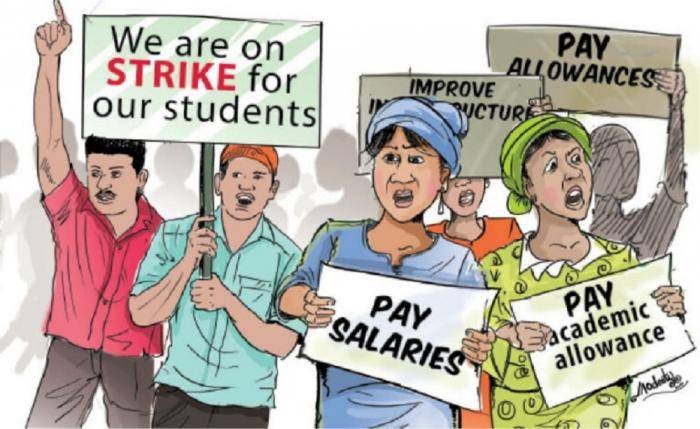
It is quite a pity that in spite of 13 years of civilian governments, no succeeding government has been able to find a lasting solution to the recurrence of strikes by university teachers in Nigeria.
There is no doubting the fact that one of the major causes of educational backwardness in this country is incessant strikes by university lecturers, which are always precipitated by disagreements between government and teachers.
Going down memory lane, it is important to make mention of some protracted strikes during the military and present civilian regimes.
The universities' academic calendar were greatly disrupted during the days of the military dictator, General Ibrahim Badamosi Babangida (retd).
The situation degenerated from bad to worse during the regime of another despot, the late General Sani Abacha. We also experienced ASUU strike when the then President of Nigeria, Chief Olusegun Obasanjo failed to implement the agreement reached with university teachers.
In a similar vein, the late President Umaru Musa Yar'Adua clashed with ASUU and another strike ensued.
It is so unfortunate that the history of ASUU's industrial action repeated itself in the present day Nigeria, when we all thought that Dr. Goodluck Jonathan, who is a democratically elected president and a former academic, will set the records straight.
Effects of strikes
Speaking with Vanguard Learning, Professor Peter Okebukola, former NUC Executive Secretary said; "It is important not to narrow down strikes in Nigerian universities to only one group such as the Academic Staff Union of Universities (ASUU). There are four staff unions (ASUU, SSANU, NASU and NATT) any of which is capable of inflicting damage on the system when it calls its members out on strike.
"There is also the Students' Union. The five unions should be discussed in matters relating to effects of strikes on the Nigerian university system. Ostensibly, it is the strike by ASUU that is apparently most impactful.
"I see seven negative and two positive effects of such strikes. On the negative side is the depressing effect on the quality of graduates from Nigerian universities since time lost due to strikes that should be used for delivering the curriculum is not gained after the strike.
"The typical scenario is to condense content that should have been taught for the period of the strike to about a fifth of the expected and rush students to examinations thereafter. This is recipe for half-baked products.
"The second effect is the poor public image of Nigerian universities. Locally, that is in Nigeria, the public is unimpressed with the universities on account of the frequency of strikes.
Globally, there is the usual sneer when Nigerian universities are mentioned and a quick link with unstable university calendar due to frequent strikes. This image robs graduates of our universities of international esteem even when their worth has not been proven through employment.
Additionally, top-rate universities that are desirous of staff and student exchange will elect to partner with universities with stable academic calendar in other parts of Africa.
The third effect is loss of revenue. Many potential students prefer universities in neighbouring African countries including Ghana, Benin and Togo not because of superiority of academic programme offerings but because of instability of academic calendar owing to strikes.
These countries earn huge revenue from Nigerian students attending their universities. Fourth is financial loss to the universities. When the university shuts down due to strikes, staff are paid, even if it is several months after, but they end up being paid.
The university runs and pays for services such as power and water as well as running and maintenance of vehicles.
An estimate of this internal and external loss to the Nigerian public university system for one month of total strike involving all the unions is in the neighbourhood of N38.2bn.
The fifth effect is psychological on the part of students who have to stay idle at home, lamenting their woes and causing irritation to parents.
Internet fraud
The sixth effect closely connected to the fifth is engagement of the idle students in social vices including joining bad gangs and engagement in internet fraud. Not a few cases of pregnancy of young undergraduates during the period of strike have been reported.
The seventh is what can be broadly grouped as collateral effect. Some undergraduates die in road accidents during the period of the strike in an attempt to "stretch their legs" to visit friends to kill the idleness.
There are two seemingly positive effects. Strikes when moderately implemented are indicative of the positive human rights posture of government and that as a democracy, we give allowance for the labour law which empowers workers to express their grievances through strike.
Secondly, it would appear that the major gains of the Nigerian university system in terms of improved conditions of service for staff and improvement in the physical conditions for teaching, learning and research have been attained as "dividends of strikes."
There is no university system in the world that has no strike history. However, ours in Nigeria is at the extreme with strikes lingering for months. In North America, Europe and Asia where the top-ranked universities reside, strikes last for a few hours or maximum one day! The unions in Nigerian universities should be entreated to explore dialogue to the fullest before calling out their members on strike."
Professor Biko Agozino, a professor of sociology and Director of Africana Studies Programme, Virginia Tech, Blacksburg, in one of his publications said:
"The time has come for us to review the permanent revolution strategy of ASUU and see if the mode of protest has outstripped the means of protest and what needs to be done. The preferred means of protest by ASUU is the declaration of indefinite strikes. If we look around the world, it is clear that this means of protest is no longer as popular as it once seemed in the 20th Century.
Indefinite strikes by university teachers are almost unheard of in a modern university where the mode of struggle is predominantly intellectual and moral for obvious reasons.
If the universities in Nigeria are nowhere in the ranking of the top 1,000 universities in the world, it may not be simply because of inadequate funding but also because for large chunks of the academic year that university academic staff are on strike for legitimate reasons when they could be contributing scholarly growth that would propel our institutions into the list of some of the best in the world."

